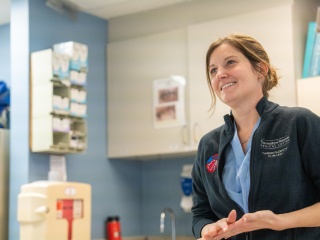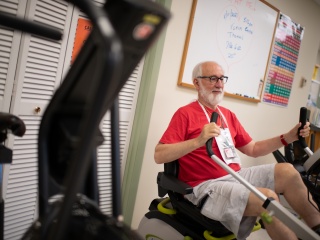Minimally Invasive Mitral Valve Procedures
Mitral Valve Care at UVM Health
If you have been diagnosed with heart valve disease, non-surgical procedures can help improve your quality of life.
Catheter-based procedures, such as mitral transcatheter edge-to-edge repair (M-TEER) and transcatheter mitral valve repair (TMVR) can improve mitral valve regurgitation to improve your symptoms and prolong life without need for open heart surgery. We also offer solutions for mitral valve stenosis, such as balloon mitral valvotomy (BMV) and TMVR to help patients with narrowing of the mitral valve.

Why Choose UVM Health?
Heart and vascular specialists at University of Vermont Health are experts in performing non-surgical procedures in patients across Vermont and northern New York.
As one of the leading heart and vascular programs in the region, we offer:
- Excellent outcomes: Our cardiology teams track all patient outcomes in national databases, and our results consistently meet and even exceed national benchmarks.
- Advanced treatments: We are participating in a prestigious clinical trial to evaluate a novel TMVR platform called the Intrepid valve. This technology allows for the mitral valve to be replaced without open heart surgery. Our experts will evaluate you for both commercial options and state-of-the-art clinical trials during your visit with us.
- Patient-centered care: Exceptional care takes more than advanced technology — it also requires a team of skilled and compassionate experts who understand how and when to use that technology to find the treatment that’s right for you and your needs.
Conditions We Treat
- Mitral valve regurgitation: Mitral valve regurgitation (MVR) occurs when your mitral valve doesn’t close properly. As a result, blood leaks from your lower left heart chamber (ventricle) into your upper left heart chamber (atrium).
- Mitral stenosis: Mitral stenosis (MS) occurs when your mitral valve does not open properly. As a result, blood backs up into your left upper heart chamber (left atrium) and lungs causing heart failure.
What to Expect
Not all patients are eligible for minimally invasive procedures. To qualify, you must be:
- Experiencing symptoms, such as fatigue and shortness of breath, that are adversely affecting your quality of life and/or could lead to a heart attack or heart failure
- Deemed high risk for surgery, as determined by a cardiac surgeon, if you have primary mitral valve regurgitation
- Qualified for an optimized regimen of medication (if you have secondary mitral regurgitation)
If you qualify, we offer a non-surgical outpatient procedure that typically takes between two and three hours. You will need to spend one or two nights in the hospital after the procedure for monitoring.
For patients healthy enough for surgery, we offer conventional mitral valve surgery to repair or replace the valve.
Transcatheter edge-to-edge repair (TEER) of the mitral valve reduces mitral valve leakage by using one or more clips (MitraClip™) that resemble a small clothespin to hold the valve partially closed.
In this procedure, your cardiologist:
- Places a percutaneous catheter (a long, thin tube inserted through your skin) into a blood vessel in your groin. This catheter holds a clip. Your cardiologist moves the catheter through the blood vessel until it reaches your heart.
- Pinch parts of the loose valve together with the clip, through the catheter. This tightens the valve, but because it leaves gaps on either side of the clip, it does not completely stop leakage.
- Ensures optimal placement, using echocardiography (ultrasound imaging). They will watch how the blood flows during each heartbeat to determine if the clip has stopped enough leakage. If it hasn’t, they will reposition the clip or add another.
BMV is used to treat mitral valve stenosis. This minimally invasive catheter-based procedure uses a balloon to enlarge a narrowed mitral valve to improve blood flow between the heart's left chambers.
In this procedure, your cardiologist:
- Places a percutaneous catheter (a long, thin tube inserted through your skin) into a blood vessel in your groin.
- Moves the catheter through the blood vessel until it reaches the narrowed mitral valve in your heart.
- The balloon is inflated, gently stretching the valve open and improving blood flow.
- The balloon is deflated and removed.
Locations near you
Share your location to see nearby providers and availability
118 Tilley Drive
Suite 102
South Burlington, VT 05403-4450
62 Tilley Drive
Suite 101
South Burlington, VT 05403-4407


